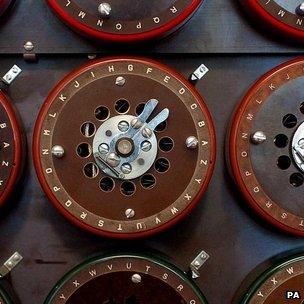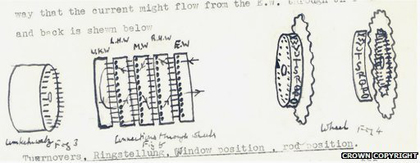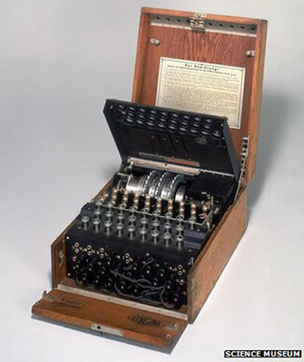Jack Copeland: Turing, pioneer of the information age

 |
Talk by Jack Copeland Host. Dennis Allison Stanford University |
|
Turing: Pioneer of the Information Age
 At the turn of the millennium Time magazine listed Alan Turing among the twentieth century’s 100 greatest minds, alongside the Wright brothers, Albert Einstein, DNA busters Crick and Watson, and the discoverer of penicillin, Alexander Fleming. Turing’s achievements during his short life of 42 years were legion. Best known as the genius who broke some of Germany’s most secret codes during the war of 1939-45.
At the turn of the millennium Time magazine listed Alan Turing among the twentieth century’s 100 greatest minds, alongside the Wright brothers, Albert Einstein, DNA busters Crick and Watson, and the discoverer of penicillin, Alexander Fleming. Turing’s achievements during his short life of 42 years were legion. Best known as the genius who broke some of Germany’s most secret codes during the war of 1939-45.
Left is an image of the Turing-Welchman Bombe, the British bombe, the name of an electro-mechanical machine, developed during WWII by Alan Turing and Gordon Welchman while working as codebreakers at Bletchley Park. This machine was used to help in breaking the German Enigma codes and was (partly) based on the so-called bomba, an earlier machine developed by Polish mathematicians in 1938. From 1943 onwards, an improved version of the 4-sheel bombe was built in the US by the US Navy and, separately, by the US Army.
Turing was also the father of the modern computer. Today, all who click or touch to open are familiar with the impact of his ideas. To Turing we owe the brilliant innovation of storing applications, and the other programs necessary for computers to do our bidding, inside the computer’s memory, ready to be opened when we wish. We take for granted that we use the same slab of hardware to shop, manage our finances, type our memoirs, play our favorite music and videos, and send instant messages across the street or around the world. Like many great ideas this one now seems as obvious as the cart and the arch, but with this single invention—the stored-program universal computer—Turing changed the world.
Turing was a theoretician’s theoretician, yet like Leonardo da Vinci and Isaac Newton before him he also had immensely practical interests. In 1945 he designed a vast stored-program electronic computer called the Automatic Computing Engine, or ACE. Turing’s sophisticated ACE design achieved commercial success as the English Electric Company’s DEUCE, one of the earliest electronic computers to go on the market. In those days–the first eye-blink of the Information Ag–the new machines sold at a rate of no more than a dozen or so a year. But in less than four decades, Turing’s ideas transported us from an era where ‘computer’ was the term for a human clerk who did the sums in the back office of an insurance company or science lab, into a world where many have never known life without the Internet.
‘Turing: Pioneer of the Information Age’ is an introduction to Turing and his ideas, from the universal computing machine of 1936 through Bletchley Park and the ACE to his famous 1950 article Computing Machinery and Intelligence. Below is a drawing for his early computer, the Enigma Machine.

 Brian Jack Copeland is Professor of Philosophy at the University of Canterbury, Christchurch, New Zealand and author of books on computing pioneer Alan Turing. His education includes a BPhil and a DPhil from the University of Oxford in philosophy, where he undertook research on modal and non-classical logic under the supervision of Dana Scott. Jack Copeland is the Director of the Turing Archive for the History of Computing, an extensive online archive on the computing pioneer Alan Turing. He has also written and edited books on Turing. He is one of the people responsible for identifying the concept of hypercomputation and machines more capable than Turing machines. Copeland has held visiting professorships at the University of Sydney, Australia (1997, 2002), the University of Aarhus, Denmark (1999), the University of Melbourne, Australia (2002, 2003), and the University of Portsmouth, United Kingdom (1997–2005). In 2000, he was a Senior Fellow in the Dibner Institute for the History of Science and Technology at the Massachusetts Institute of Technology, United States. He is also President of the US Society for Machines and Mentality and a member of the UK Bletchley Park Trust Heritage Advisory Panel. He is the founding editor of The Rutherford Journal, established in 2005.
Brian Jack Copeland is Professor of Philosophy at the University of Canterbury, Christchurch, New Zealand and author of books on computing pioneer Alan Turing. His education includes a BPhil and a DPhil from the University of Oxford in philosophy, where he undertook research on modal and non-classical logic under the supervision of Dana Scott. Jack Copeland is the Director of the Turing Archive for the History of Computing, an extensive online archive on the computing pioneer Alan Turing. He has also written and edited books on Turing. He is one of the people responsible for identifying the concept of hypercomputation and machines more capable than Turing machines. Copeland has held visiting professorships at the University of Sydney, Australia (1997, 2002), the University of Aarhus, Denmark (1999), the University of Melbourne, Australia (2002, 2003), and the University of Portsmouth, United Kingdom (1997–2005). In 2000, he was a Senior Fellow in the Dibner Institute for the History of Science and Technology at the Massachusetts Institute of Technology, United States. He is also President of the US Society for Machines and Mentality and a member of the UK Bletchley Park Trust Heritage Advisory Panel. He is the founding editor of The Rutherford Journal, established in 2005.
Left. Enigma Machine, wheels, lamps and plugboard exposed. After the operator had inserted the correct wheels for the day, he closed the inner lid.
![]()
